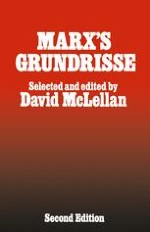1980 | OriginalPaper | Chapter
Leisure and Free Time in Communist Society
Author : David McLellan
Published in: Marx’s Grundrisse
Publisher: Palgrave Macmillan UK
Included in: Professional Book Archive
Activate our intelligent search to find suitable subject content or patents.
Select sections of text to find matching patents with Artificial Intelligence. powered by
Select sections of text to find additional relevant content using AI-assisted search. powered by
Real economy — savings — consists in the saving of working time (the minimum, and reduction to the minimum, of production costs); but this saving is identical with the development of productivity. Economising, therefore, does not mean the giving up of pleasure, but the development of power and productive capacity, and thus both the capacity for and the means of enjoyment. The capacity for enjoyment is a condition of enjoyment and therefore its primary means; and this capacity is the development of an individual’s talents, and thus of the productive force. To economise on labour time means to increase the amount cf free time, i.e. time for the complete development of the individual, which again reacts as the greatest productive force on the productive force of labour. From the standpoint of the immediate production process it may be considered as production of fixed capital; this fixed capital being man himself. It is also self-evident that immediate labour time cannot remain in its abstract contradiction to free time — as in the bourgeois economy. Work cannot become a game, as Fourier would like it to be; his great merit was that he declared that the ultimate object must be to raise to a higher level not distribution but the mode of production.
